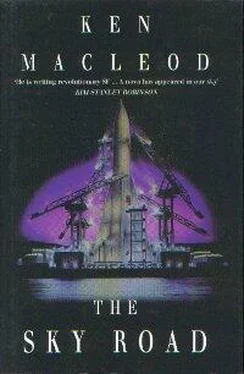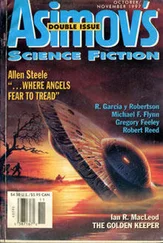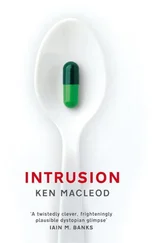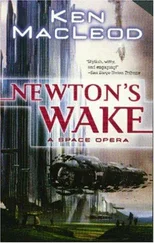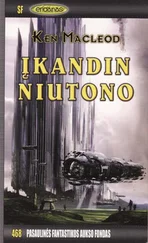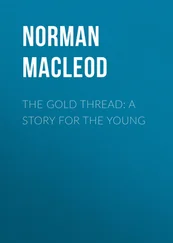Ken Macleod - The Sky Road
Здесь есть возможность читать онлайн «Ken Macleod - The Sky Road» весь текст электронной книги совершенно бесплатно (целиком полную версию без сокращений). В некоторых случаях можно слушать аудио, скачать через торрент в формате fb2 и присутствует краткое содержание. Год выпуска: 1999, ISBN: 1999, Издательство: Orbit, Жанр: Фантастика и фэнтези, на английском языке. Описание произведения, (предисловие) а так же отзывы посетителей доступны на портале библиотеки ЛибКат.
- Название:The Sky Road
- Автор:
- Издательство:Orbit
- Жанр:
- Год:1999
- ISBN:1-85723-755-2
- Рейтинг книги:3 / 5. Голосов: 1
-
Избранное:Добавить в избранное
- Отзывы:
-
Ваша оценка:
- 60
- 1
- 2
- 3
- 4
- 5
The Sky Road: краткое содержание, описание и аннотация
Предлагаем к чтению аннотацию, описание, краткое содержание или предисловие (зависит от того, что написал сам автор книги «The Sky Road»). Если вы не нашли необходимую информацию о книге — напишите в комментариях, мы постараемся отыскать её.
The Sky Road — читать онлайн бесплатно полную книгу (весь текст) целиком
Ниже представлен текст книги, разбитый по страницам. Система сохранения места последней прочитанной страницы, позволяет с удобством читать онлайн бесплатно книгу «The Sky Road», без необходимости каждый раз заново искать на чём Вы остановились. Поставьте закладку, и сможете в любой момент перейти на страницу, на которой закончили чтение.
Интервал:
Закладка:
They walked down the streets and across the squares quite unchallenged, though one or two people gave Myra a curious glance, as though recognising her from her television appearance the previous evening. Apart from the parked tanks on the street-corners, around each of which a curious crowd, mainly of children and young people, fraternised with the relaxed-looking crew, the town so far showed litde sign of being caught up in a social revolution. It was the weird fighting-machines that were alarming. They stalked and lurched about like Martian invaders; but the locals treated them with casual familiarity, like traffic or street-furniture. Perhaps, Myra thought wryly, it was the absence of searing heat-rays and writhing metal tentacles that did the trick.
As well as those combat drones, big clunky calculating-machines were being installed, indoors in shop-fronts and factories, outdoors in the squares. Gears and teeth and crystal spheres, building to frenetic orreries of some alternate solar systern, Copernican with Ptolemaic epicyles. Nanotech dripped and congealed around the brass and steel, like epoxy that never quite set. Around noon Myra and her companions watched one being winched off a flatbed truck and placed carefully in a plaza below a cosmonaut monument.
“Fucking bizarre,” said Myra, half to herself, as a Sheenisov cadre clambered on to the plinth and began an explanatory harangue in Uzbek, not one of her languages.
“With this they will replace the market,” Nurup scoffed, under his breath. “God help us all.”
A lively market in soft drinks and hot food was already forming around the strange device. Nurup and Mustafa bought her Coke and kebabs, and themselves a hotdog each. Both talked quietly to the stall-keepers. Taking the food, they sat down on a bench and ate.
“There is much discontent,” Mustafa said eagerly.
“Bazaar gossip,” Nurup said. “Stall-keepers will tell you anything. They will tell the Sheenisov they love them.”
The two men argued obliquely but intensely for a few minutes about the prospects for terrorist action against the Sheenisov.
“We’re not here for that,” Myra reminded them. She shared out cigarettes, then together they walked out of the square. Neither of the men raised any questions about her random following of the streets, until they ended up at the bank of the broad Irtysh river. Flats on the opposite bank, a riverside walk on this. A small pleasure steamer chugged downriver, ferrying a calculating-machine on its promenade deck.
Myra leaned against a railing, gazing into the river. The two men leaned against the railing, looking the other way. People passed. After a few minutes of this Mustafa asked what was going on.
“Nothing,” said Myra, not turning around. “Or maybe something. I’m assuming we’ve been followed, or watched. I’m quite prepared to wait here for at least an hour. Make yourselves comfortable.”
But they were too edgy and too alert to be comfortable. The most they did was light another of her Dunhills. Myra slipped her eyeband down and was at once struck by a sense of deja vu, as the whole scene around her hazed over, sleeted with grey flecks. After a moment she realised the source of that sense of recognition—it reminded her of how she’d first seen towns like this, back in the 90s: through their Soviet pollution haze. She blinked, moved the eyeband up and down, tried to pick up the nets. Nothing but the grey snow. Even Parvus,. summoned from memory, looked frazzled by it.
Sheenisov jamming. Shit.
She’d just given up this experiment when she heard her name called. She turned. Shin Se-Ha and Kim Nok-Yung walked side by side by the pathway, waving to her.
“It’s all right,” she told her swiftly tense bodyguards. “I know these guys.”
She shook hands, smiling, with the Korean and the Japanese; introduced them to the Kazakhstanis. Discreet compliments on her rejuvenated appearance were exchanged with her admiration for their now healthier physiques. Even their relatively humane imprisonment had marked them, weighing them down with something which their new freedom—if freedom it was—had enabled them to shrug off. They walked taller. They confronted the Kazakhstani emigres unabashed.
“So, you are Sheenisov,” said Mustafa, in a disgusted tone.
“Lay off,” said Myra. “They’re OK We have to talk.”
“Yes,” said Nok-Yung. “We have to talk.”
It was a mild day, for the time of year. Not shirtsleeve weather, but comfortable if you dressed warm, as they all had. Myra indicated a semi-circle of benches in a concreted picnic area along the bank a little. The two ex-prisoners shrugged, then nodded.
Nok-Yung and Se-Ha sat on either side of her, the two bodyguards on separate benches a few metres away. Children, snug-wrapped in quilted satin bomberjackets and padded trousers, capered about and yelled, oblivious to the adults.
“So how are you getting on, in this brave new world?” Myra asked.
“We’re fine,” said Nok-Yung, his comrade nodding emphatically. “Our families are joining us soon, and in die meantime we have much to do.”
“You both got jobs?” Myra smiled.
“There are no jobs,” Se-Ha said primly. “There is work. We have been… co-opted, and we have been sent to talk to you.”
“Well, I had guessed this was hardly a coincidence,” Myra said. “But I had not expected to see you as Sheenisov cadre already.”
“It’s an open system,” Nok-Yung said. “Interesting contributions are quickly taken up; amplified; discussed.”
“The opposite of the nets, then,” Myra said. They laughed.
“And the opposite of the Leninist system,” Nok-Yung said earnestly. “Once you are in, you are in, there is no… apprenticeship? No candidacy, no working your way up. Past experience,” he added rather smugly, “ counts.”
Myra flashed her eyebrows. No doubt the militant and the Marxist mathematician had found their niches quickly. Tm sure that’s all fascinating,” she said. “But I’m here to put a diplomatic proposal to the Sino-Soviet Union as a whole. Can I do that, just by talking to you?”
“Yes.”
“Very well.” She put it to them, straight: the deal, the crossing corridors. Let the revolutionary horde flow around Kazakhstan, like a flood around a rock, and they could swamp the rest of the world, for all she cared. (Gould and would run into the sand, she did not say, but that was what she expected.)
They listened politely, now and then asking for clarification, making notes and doodling maps on hand-held slates that—while obviously information-retrieval devices—looked as though they were made of… slate. Se-Ha stood up.
“I must consult,” he said, nodded, and walked briskly away. Nok-Yung accepted a cigarette, and leaned back luxuriantly, sprawling out with his elbows on the back of the bench. He regarded Myra through narrow eyes and curling smoke.
“Why do you resist the SSU, Myra?” he asked mildly. “It is only democracy. It is only socialism. A means—and an end, compatible at last, after all the disasters and crimes done in the name of both.” He spread his hands. “There are no secrets here, no deceptions. When you were as young as you look—” he smiled “—you would have thought this revolution, this liberation more wonderful than your wildest dreams.”
“Don’t let my mujahedin friends hear you say that!” she warned, half in jest. She glanced over at Nurup Kerbayev. He smiled back, eyes and teeth flashing like knives.
“But you’re right,” she went on. “Let’s just say… I may look young again, but I’ve had a long, long life in the meantime. I’ve come to believe in myself, and in… my country, Kazakhstan. And I will not be assimilated, and nor will we.” She waved a hand around. “These people, they may seem… happy enough to wait and see. But deep down, no—just below the surface—they are seething with suspicion. They are not your Mongolians or Siberians, who God knows had it bad enough under Stalinism but who found everything since was worse. To the Kazakhs socialism means ‘the tragedy’ of the 1930s: the forced settlement, the famine. It means the nuclear tests, the cancers, the birth defects. They don’t want to be the subjects of any more experiments. And if you want to point to the ISTWR as a counterexample—that was a special case. A self-selected minuscule minority. Our socialism was always a joke, more black humour than Red. Trotskyism in one country—what a laugh!”
Читать дальшеИнтервал:
Закладка:
Похожие книги на «The Sky Road»
Представляем Вашему вниманию похожие книги на «The Sky Road» списком для выбора. Мы отобрали схожую по названию и смыслу литературу в надежде предоставить читателям больше вариантов отыскать новые, интересные, ещё непрочитанные произведения.
Обсуждение, отзывы о книге «The Sky Road» и просто собственные мнения читателей. Оставьте ваши комментарии, напишите, что Вы думаете о произведении, его смысле или главных героях. Укажите что конкретно понравилось, а что нет, и почему Вы так считаете.
